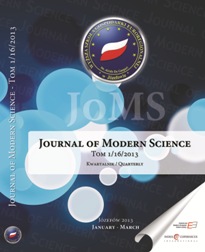Samoocena i poczucie alienacji jako predyktory jakości życia osób z niepełnosprawnością ruchową.
Self-esteem and a sense of alienation as predictors of quality of life people with physical disabilities.
Author(s): Jarosław Jastrzębski, Milena PasiakSubject(s): Sociology, Social development, Social differentiation
Published by: Wydawnictwo Akademii Nauk Stosowanych WSGE im. A. De Gasperi w Józefowie
Keywords: self-esteem; a sense of alienation; satisfaction with life; disability;
Summary/Abstract: The aim of the study was to test several important hypotheses about the importance of self-esteem and a sense of alienation in the development of the quality of life of people with physical disabilities. The study involved 60 people with congenital (N = 16) or acquired (N = 44) physical disabilities. Among them were 30 women and 30 men aged from 25 to 64lat (mean = 47y.o.). The study used three questionnaires. Quality of life was assessed using the Life Satisfaction Questionnaire FLZ J. Fahrenberg, M. Myrtek, J. Schumacher and E. Brahler in the Polish adaptation of Jan Chodkiewicz. A sense of alienation has been studied using the Test Sense of Alienation PAI in the development of Krystyna Kmiecik-Baran. Finally, the participants completed M. Rosenberg’s Scale Self-Esteem SES in the Polish adaptation of Irena Dzwonkowska, Kinga Lachowicz-Tabaczek and Mariola Łaguna. The results showed that: (1) there is a positive relationship between self-esteem and quality of life, (2) there is a negative correlation between the sense of alienation and quality of life, (3) women revealed significantly greater than men’s satisfaction with their own health, (4) there are significant sex differences on the role played by self-esteem and a sense of alienation in shaping the quality of life.
Journal: Journal of Modern Science
- Issue Year: 19/2013
- Issue No: 4
- Page Range: 83-105
- Page Count: 23
- Language: Polish

